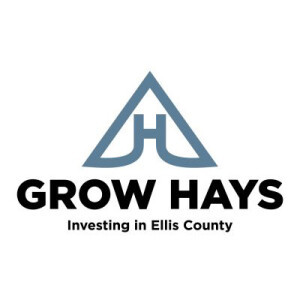grow hays
grow hays



Friday Dec 15, 2023
Grow Hays director discusses Medicaid expansion
Friday Dec 15, 2023
Friday Dec 15, 2023
On this episode of the Post Podcast, Hays Post Reporter Cristina Janney speaks with Grow Hays Executive Director Doug Williams about the recent letter of support signed by the Hays City Commission to support Medicaid expansion.



Friday Nov 10, 2023
Grow Hays announces Ellis County Youth Entrepreneurship Challenge winners
Friday Nov 10, 2023
Friday Nov 10, 2023
On this episode of the Post Podcast, Hays Post Reporter Cristina Janney speaks with Grow Hays Executive Director Doug Williams about the latest Ellis County Youth Entrepreneurship Challenge.
Read more about the event on Hays Post.



Friday Nov 03, 2023
Planning underway for new apartment complex in Hays
Friday Nov 03, 2023
Friday Nov 03, 2023
On this episode of the Post Podcast, Hays Post Reporter Cristina Janney speaks with Grow Hays Executive Director Doug Williams about a 48-apartment development planned on West 10th St.



Monday Oct 30, 2023
Grow Hays director explains Ellis County property tax levels
Monday Oct 30, 2023
Monday Oct 30, 2023
On this episode of the Post Podcast, Hays Post reporter Becky Kiser discusses Ellis County property taxes with Grow Hays Executive Director Doug Williams.



Friday Oct 20, 2023
Grove Community Center receives $3.6 M grant
Friday Oct 20, 2023
Friday Oct 20, 2023
On this episode of the Post Podcast, Hays Post Reporter Cristina Janney speaks with Grow Hays Executive Director Doug Williams about a $3.6 million grant award for The Grove Housing Development's Community Center.
Read about the grant award at Hays' Grove housing development receives $3.6 M grant for community center



Sunday Oct 15, 2023
Development continues in Hays Tallgrass Addition
Sunday Oct 15, 2023
Sunday Oct 15, 2023
On this episode of the Post Podcast, Hays Post Reporter Cristina Janney discusses the ongoing development in the Heart of America Tallgrass Addition with Grow Hays Executive Director Doug Williams.



Sunday Oct 01, 2023
Grow Hays gives look into franchise systems
Sunday Oct 01, 2023
Sunday Oct 01, 2023
On this episode of the Post Podcast, Grow Hays executive director Doug Williams discusses franchise systems following their Trispectives presentation.



Sunday Sep 24, 2023
Planned 24/7 location continues development north of I-70 in Hays
Sunday Sep 24, 2023
Sunday Sep 24, 2023
On this episode of the Post Podcast, Grow Hays executive director Doug Williams discusses the development of a 24/7 travel plaza in Hays and potential future development north of I-70 in Hays.



Sunday Sep 17, 2023
Grow Hays preps for the upcoming Icehouse Series, Quarterly Luncheon
Sunday Sep 17, 2023
Sunday Sep 17, 2023
On this episode of the Post Podcast, Grow Hays executive director Doug Williams discusses the upcoming Icehouse, Think Like an Entrepreneur series and Quarterly Luncheon.



Friday Sep 08, 2023
Grow Hays plans fall events
Friday Sep 08, 2023
Friday Sep 08, 2023
On this episode of the Post Podcast, Grow Hays executive director Doug Williams shares information on upcoming events at Brief Space.



Friday Sep 01, 2023
As work continues on MicroFactory Grow Hays looks to possible tenants
Friday Sep 01, 2023
Friday Sep 01, 2023
On this episode of the Post Podcast, Grow Hays Director of Recruitment and Retention David Clingan shares updates from the MicroFactory project.



Friday Aug 25, 2023
Hays City Commission approves annexation of land for The Grove
Friday Aug 25, 2023
Friday Aug 25, 2023
On this episode of the Post Podcast, Grow Hays executive director Doug Williams discusses the annexation of land that will be home to The Grove.
Read more about the project on Hays Post.



Friday Aug 11, 2023
Tallgrass Addition phase two construction underway
Friday Aug 11, 2023
Friday Aug 11, 2023
On this episode of the Post Podcast, Grow Hays executive director Doug Williams shares updates on the Tallgrass Addition.



Friday Aug 04, 2023
Brief Space to celebrate five year anniversary
Friday Aug 04, 2023
Friday Aug 04, 2023
On this episode of the Post Podcast, Grow Hays executive director Doug Williams discusses the upcoming five year anniversary of Brief Space.



Friday Jul 28, 2023
City, county governments preparing 2024 budgets
Friday Jul 28, 2023
Friday Jul 28, 2023
On this episode of the Post Podcast, Grow Hays executive director Doug Williams discusses the budget process for city and county governments in the area.



Friday Jul 21, 2023
City of Hays buys land near 27th and Main
Friday Jul 21, 2023
Friday Jul 21, 2023
On this episode of the Post Podcast, Grow Hays executive director Doug Williams discusses the City of Hays' purchase of land near 27th and Main.
Find out more about the purchase at Hays Post.



Friday Jul 14, 2023
Grow Hays exec. dir. discusses STAR Bonds
Friday Jul 14, 2023
Friday Jul 14, 2023
On this episode of the Post Podcast, Grow Hays executive director Doug Williams discusses the role and potential uses of STAR Bonds.



Tuesday Jul 11, 2023
As above ground work on Microfactory begins FHSU President joins board
Tuesday Jul 11, 2023
Tuesday Jul 11, 2023
On this episode of the Post Podcast, Grow Hays executive director Doug Williams discusses Fort Hays State University President Tisa Mason joining their board of directors while above-ground work begins on the Microfactory project.



Saturday Jun 24, 2023
Grow Hays director discusses the economics of water rights in NW Kan.
Saturday Jun 24, 2023
Saturday Jun 24, 2023
On this episode of the Post Podcast, Grow Hays executive director Doug Williams discusses the ongoing battle over the water rights from the R9 Ranch and the economic impacts.



Saturday Jun 17, 2023
Grow Hays, other area agencies submit budget requests to local governments
Saturday Jun 17, 2023
Saturday Jun 17, 2023
On this episode of the Post Podcast, Grow Hays executive director Doug Williams discusses the annual local government budget request process for Grow Hays and other area agencies.